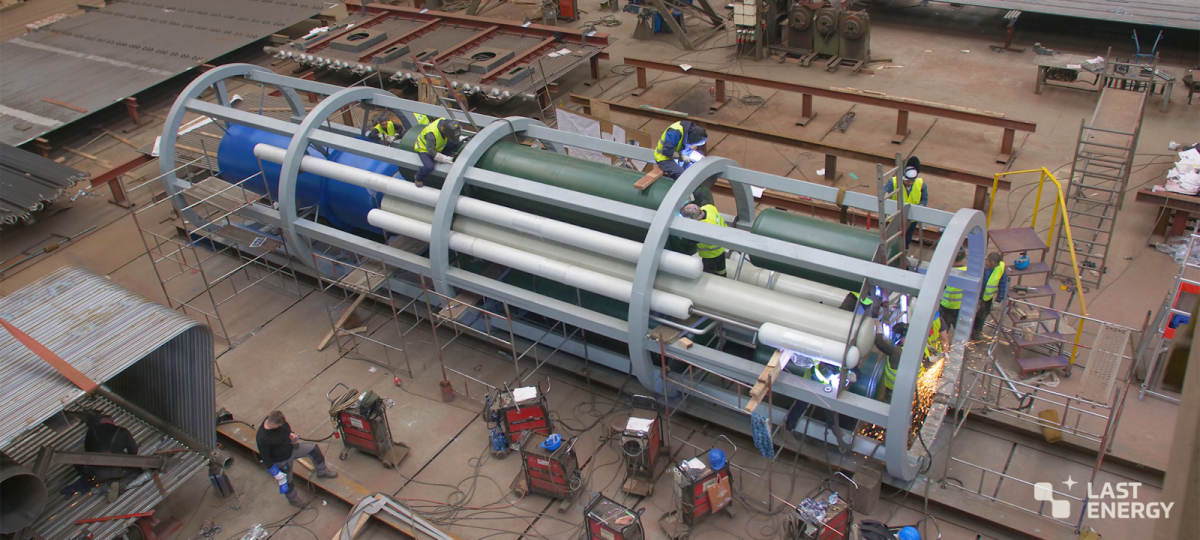Last Energy’s Series B will enable the company to continue expanding its team and invest in project development as it works to deploy its first plant, targeting a 2026 online date. Investors for the round include Gigafund, the Autodesk Foundation, and a series of family offices.
“2024 has been a monumental year for Last Energy so far,” said Bret Kugelmass, Founder and CEO of Last Energy. “In the last eight months we released a new prototype, demonstrated our fabrication and transport capabilities, nearly doubled our headcount, and accelerated commercial growth. Closing our Series B was the next step to unlocking key milestones as we continue down the path toward commercial operations.”
“We are excited to support Last Energy as they trailblaze a new era in clean and reliable energy,” said Ryan Macpherson, Director of Climate Innovation & Investment at the Autodesk Foundation. “By drastically simplifying the design-construction-operations process, leveraging technology and talent from Autodesk, Last Energy’s approach to micro-modular nuclear power has the potential to fundamentally change how we think about energy production — offering a rapid, scalable, and economically viable solution to decarbonize heavy industry.”
In addition to its Series B, the company also announced today that it has reached commercial agreements for 80 units. Last Energy announced agreements for 34 units in 2023 and began 2024 with agreements for 50 units. The company has incredibly ambitious goals, aiming to build 10,000 units in the next 15 years. Last Energy differentiates itself within the nuclear sector by focusing all technological innovation on high throughput manufacturability, rather than the industry’s historical focus on novel reactor core physics.
Of Last Energy’s agreements, 39 of the 80 units will be built to serve data center developers. Due to the uniquely intensive energy needs of services like AI and cloud computing, data centers have increasingly invested in nuclear development to ensure they have access to 24/7 clean baseload power. Microreactors offer a significantly higher energy capacity than renewables at a lower cost, with minimal land requirements, and without any of the necessary investments in storage capabilities.
In April 2024, Last Energy showcased a prototype of its nuclear reactor module at Data Center World and hosted a demonstration event for industry executives and U.S. policymakers. The showcase marked the first time a microreactor prototype was ever displayed in Washington, D.C., even passing in front of the U.S. Capitol. The company has plans for two new prototypes, which will be revealed in 2025.
“Data centers and heavy industry are trying to grapple with a very complex set of energy challenges, and Last Energy has seen them realize that micro-nuclear is the only capable solution,” continued Kugelmass. “More than ever, data centers need technologies that can simultaneously provide energy abundance, ensure energy security, and enable decarbonization. Nuclear power is the only resource that can check all of those boxes on paper, but it will only be feasible if nuclear development becomes faster and more affordable in practice. Last Energy is doing that by miniaturizing, modularizing, and productizing nuclear plants, which is critical to unlock nuclear energy at scale.”
Last Energy’s goal is to turbocharge nuclear growth by addressing the shortcomings of traditional nuclear development. By building 20 MWe plants that are micro-scale, completely modular, and mass-manufacturable, Last Energy’s delivery model significantly reduces the time and cost to deploy units.
A Last Energy plant, referred to as the PWR-20, is comprised of a few dozen modules that snap together like a LEGO kit. The PWR-20 is designed to be fabricated, transported, and assembled within 24 months, and is sized to serve private industrial customers. Under its development model, Last Energy owns and operates its plug-and-play power plant on the customer’s site, bypassing the decade-long development timelines of electric transmission grid upgrade requirements.
Last Energy finally announced today that it has reached 70 full-time staff, hiring 31 new employees since August 2023. Additions over the last 12 months include a global head of safety and licensing, regulatory leads for Last Energy’s target markets (Poland, Romania, and the UK), and a CEO of the company’s UK subsidiary, Last Energy UK.




